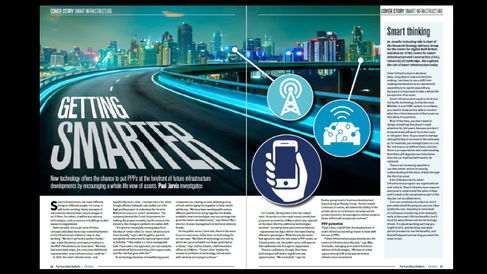
The cover story of the Autumn issue of Partnerships Bulletin entitled ‘Getting smarter’ focuses on smart infrastructure and features expert contributions, including Dr Jennifer Schooling, Director of CSIC.
The article considers the role of technology in smart infrastructure, future funding models, data security and taking a whole life view of assets. In a side bar titled ‘Smart Thinking’, Dr Jennifer Schooling explains that the role of smart infrastructure is to inform better decision-making through the collection and analysis of data. She makes the point that maintenance of the built environment should not be seen as an operational cost but as a capital expenditure. Dr Schooling advocates taking a whole-life perspective of an asset. She argues that innovation is important but understanding actual need is paramount – there is no point building a structure that does not need maintenance for 100 years if we can’t forecast the use of that asset in the long term.
A lot of the barriers to smart infrastructure progress are organisational and cultural. Smart infrastructure requires everyone to understand the value of data and it needs to be recognised as part of the day job, not an added extra. Dr Jennifer Schooling, Director CSIC
Emphasising that everyone needs to understand the value of data, Dr Schooling believes that measuring how an asset performs is not an optional activity. She says: “A lot of the barriers to smart infrastructure progress are organisational and cultural. Smart infrastructure requires everyone to understand the value of data and it needs to be recognised as part of the day job, not an added extra.” Cost might be a barrier, but continuous monitoring of an asset brings benefits. Investments in the built environment must be value driven and not technology driven.
Other experts in the article agree that monitoring usage is a starting point. Smart technology is not cheap and although the private sector is willing to invest because of its long-term benefits, the public sector might not have as much flexibility in its budgets.
Innovation involves major investments and risks; for the public sector it’s imperative to offer value for money due to financial pressures and political realities. Therefore, a partnership approach can be beneficial for the private and public sector.
Ultimately, all experts in the article agree that this is a global effort as the world is an increasingly connected space and many companies and organisations operate at an international level.
Read the article, by kind permission of the magazine’s editor, here.
Partnerships Bulletinis a digital subscription magazine aimed at public-private partnerships in the UK, Europe, Middle East, Africa and Asia-Pacific. It features news, interviews and market reports on partnerships that leverage private sector resources and innovation to deliver public infrastructure. You can also visit the Partnerships Bulletin's website here.
